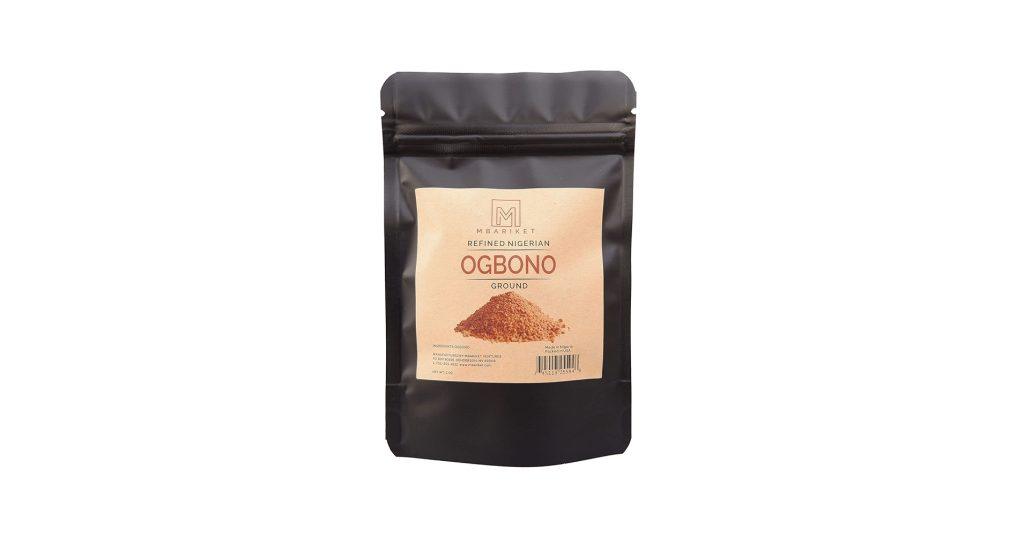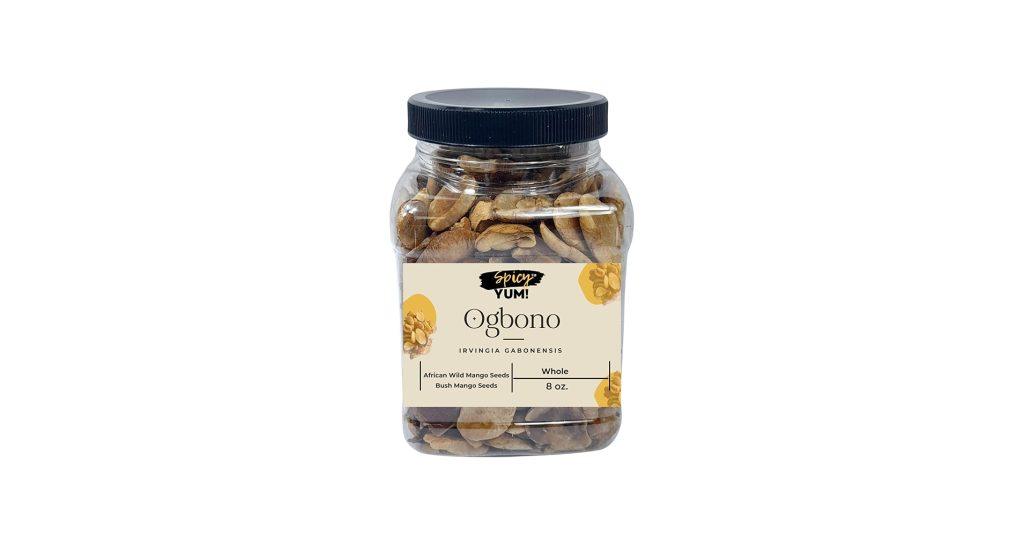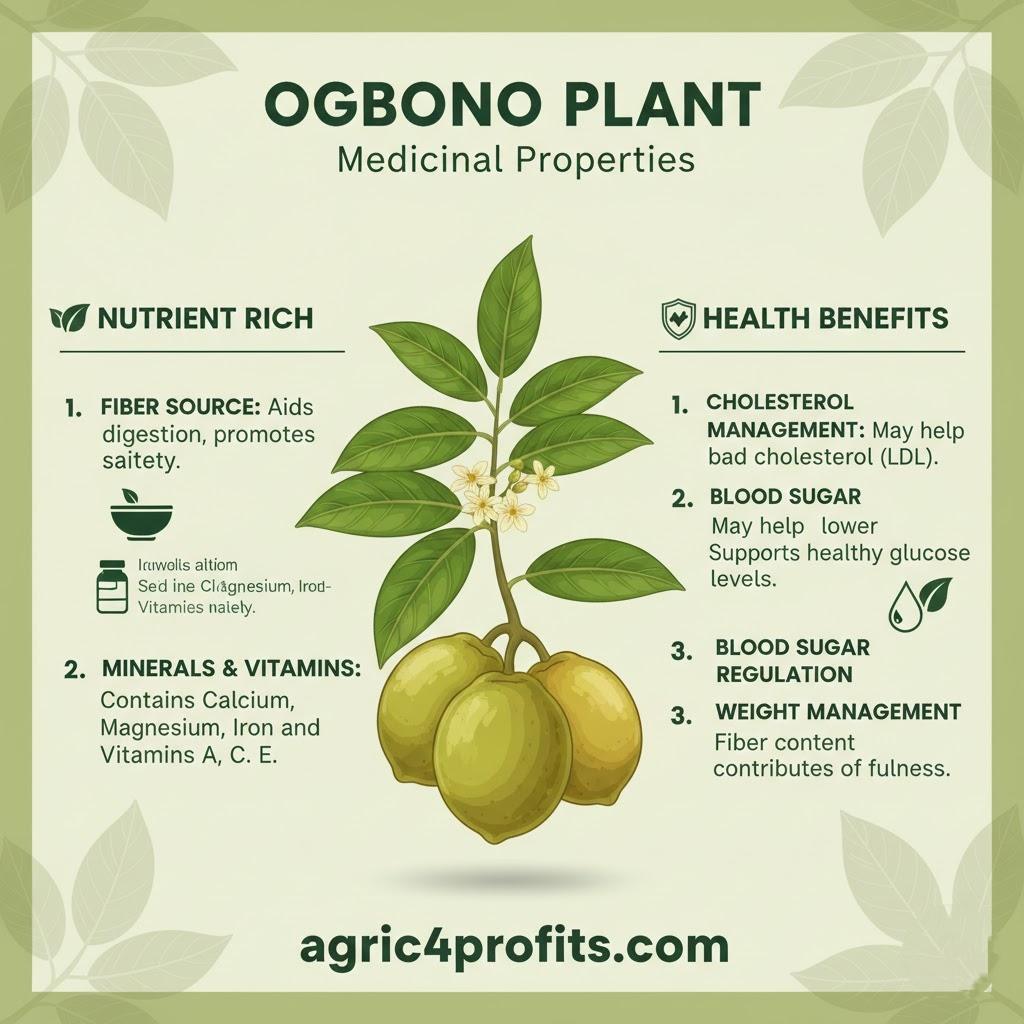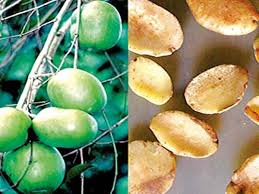The Ogbono plant, scientifically known as Irvingia gabonensis, has been recognized for centuries in traditional African medicine. Native to West Africa (including Nigeria, Cameroon, and Ghana), the tree produces seeds that are ground into Ogbono powder. This powder serves as a popular thickening agent in soups and stews while offering a rich history of use in herbal remedies.
The medicinal properties of Ogbono arise from its high nutritional content and bioactive compounds. The seeds are packed with healthy fats, proteins, and dietary fiber. They contain essential fatty acids like oleic and linoleic acids that support heart health and help regulate cholesterol. Ogbono is also rich in antioxidants that fight oxidative stress and inflammation.
In traditional practices, Ogbono treats various conditions thanks to its anti-inflammatory effects, making it useful for arthritis and other inflammatory issues. Its high fiber aids digestion, relieving constipation and diarrhea, positioning it as both a nutritious food and a functional ingredient for gastrointestinal health.
Studies indicate potential for weight management, as Ogbono promotes satiety and may reduce calorie intake. It has also been explored for regulating blood sugar, supporting diabetes management.
Topically, powdered Ogbono mixed with water or oils treats skin conditions like eczema and psoriasis due to its antimicrobial properties, which prevent infections and aid healing.
While traditional evidence is strong, approach Ogbono use cautiously. More research is needed to confirm benefits and establish dosages. Consult healthcare professionals before adding it to your regimen, especially with existing conditions or medications.
Historical Use of Ogbono in Traditional Medicine
Ogbono, from the seeds of Irvingia gabonensis, has a long history in West African traditional medicine. Indigenous communities used it as both food and medicine, rooted in cultural practices.
It served as a dietary staple in tribes, especially in Nigeria, valued for nutrition during scarcity. Ground into powder for soups, its benefits extended to healing.
Traditionally, it addressed arthritis, respiratory infections, and digestive issues via anti-inflammatory and antioxidant effects. High fiber helped with constipation and diarrhea.
It aided weight management and blood sugar control, promoting fullness for sustained energy.
Topically, pastes treated eczema, rashes, and wounds due to antimicrobial action.
Culturally, it held spiritual significance in rituals, linking nature, health, and identity.
Modern studies increasingly validate these traditional claims, particularly for weight and blood sugar benefits.
Nutritional Profile of Ogbono Seeds

1. Macronutrients: Ogbono seeds provide balanced carbohydrates, proteins, and fats — about 100 calories per serving, with 20-25g carbs, 6-8g protein, and 5-10g healthy fats for energy.
2. Dietary Fiber: High in fiber (4-6g per serving), supporting digestion, blood sugar regulation, and preventing constipation.
3. Vitamins and Minerals: Contains vitamin A, vitamin E, calcium, magnesium, and potassium for bone health, immunity, and overall wellness.
4. Protein Quality: Offers good-quality plant-based protein with essential amino acids, ideal for vegetarian/vegan diets.
Read Also: 14 Medicinal Health Benefits of Cnicus (Blessed Thistle)
Antioxidant Properties of Ogbono
1. Presence of Antioxidants: Contains phenolic acids and flavonoids that neutralize free radicals, reducing oxidative stress and cell damage.
2. Health Benefits: Lowers risk of chronic diseases like heart disease, diabetes, and cancer by protecting cells.
3. Supporting Immune Function: Enhances immunity by shielding cells from damage and aiding defense against infections.
Anti-Inflammatory Effects of Ogbono
1. Reducing Inflammation: Possesses properties that lower chronic inflammation linked to arthritis, heart disease, and other issues.
2. Role of Healthy Fats: Omega-3 fatty acids reduce inflammatory markers and ease related symptoms.
3. Supporting Overall Health: Promotes well-being by curbing inflammation through a balanced diet.
Role of Ogbono in Digestive Health
1. Promoting Digestive Health: High fiber ensures regular bowel movements and prevents constipation.
2. Supporting Gut Microbiome: Acts as a prebiotic to nourish beneficial bacteria for gut, immune, and mental health.
3. Reducing Digestive Disorders: May lower risks of IBS and diverticulitis while easing symptoms.
4. Enhancing Nutrient Absorption: Improves uptake of vitamins and minerals via healthy digestion.
Ogbono’s Impact on Blood Sugar Levels
1. Low Glycemic Index: Causes gradual blood sugar rise, ideal for diabetes management and stable energy.
2. Blood Sugar Regulation: Fiber slows carb absorption for steady glucose levels.
3. Potential Antidiabetic Effects: May improve insulin sensitivity and glucose metabolism.
4. Incorporation into Diet: Easily added to soups, stews, or smoothies for fiber and control benefits.
Potential Benefits for Heart Health
1. Healthy Fats: Unsaturated fats (including omega-3s) lower LDL and raise HDL cholesterol.
2. Antioxidant Properties: Combat oxidative stress and protect vessels from damage.
3. Blood Pressure Regulation: Potassium helps balance sodium for healthier pressure.
4. Overall Heart Health: Supports cholesterol, inflammation reduction, and pressure management.
Read Also: 22 Medicinal Health Benefits of Nutmeg (Myristica Fragrans)
Ogbono and Immune System Support

1. Nutrient-Rich Profile: Supplies vitamins A/E and minerals like zinc/magnesium for strong immunity.
2. Antioxidant Protection: Shields immune cells from oxidative damage.
3. Anti-Inflammatory Effects: Reduces chronic inflammation that impairs immunity.
4. Enhancing Overall Health: Contributes to balanced, effective immune function.
Antimicrobial Properties of Ogbono
1. Natural Antimicrobials: Inhibits bacteria and fungi growth.
2. Laboratory Studies: Effective against strains like Staphylococcus aureus and E. coli.
3. Mechanism of Action: Disrupts microbial cell membranes.
4. Applications in Food Preservation: Potential natural preservative to reduce spoilage.
Traditional Remedies Using Ogbono
1. Local Use in Cooking: Thickens soups while boosting immunity and digestion.
2. Herbal Medicine: Treats diarrhea, fever, and infections via decoctions.
3. Nutritional Supplement: Enhances energy and digestion.
4. Cultural Significance: Tied to rituals beyond culinary use.
Future Research Directions on Ogbono’s Medicinal Properties
1. Clinical Trials: Needed to validate traditional uses and standardize extracts.
2. Phytochemical Analysis: Isolate compounds for mechanism understanding.
3. Potential in Drug Development: Explore against resistant bacteria.
4. Sustainable Cultivation Practices: Study optimal growth for availability.
Scientific Evidence and Case Studies on Ogbono Plant Medicinal Properties

1. Weight Management: Ogbono promotes satiety and reduces calorie intake.
2. Blood Sugar Regulation: Fiber slows carbohydrate absorption for stable glucose levels.
3. Cholesterol Improvement: Healthy fats lower LDL and raise HDL.
4. Anti-Inflammatory Action: Reduces markers linked to chronic conditions.
5. Antimicrobial Activity: Inhibits pathogens like bacteria and fungi in studies.
Summary of Ogbono Plant Medicinal Properties
| Aspect | Key Details |
|---|---|
| Scientific Name | Irvingia gabonensis |
| Origin | West Africa (Nigeria, Cameroon, Ghana) |
| Main Form Used | Ground seeds (powder) for soups and remedies |
| Nutritional Highlights | High in healthy fats, protein, fiber, vitamins (A, E), minerals (calcium, magnesium, potassium) |
| Key Health Benefits | Supports weight loss, blood sugar control, heart health, digestion, anti-inflammation, immunity, antimicrobial effects |
| Traditional Uses | Treats arthritis, digestive issues, skin conditions, diabetes symptoms; topical for eczema/psoriasis |
| Modern Considerations | Promising but needs more clinical validation; consult professionals before use |
| Cautions | Approach with caution; further research required for dosages |
Frequently Asked Questions
1. What is Ogbono scientifically known as?
Ogbono comes from the seeds of Irvingia gabonensis, a tree native to West Africa.
2. How is Ogbono typically used in food?
It is ground into powder and used as a thickener in soups and stews, especially in Nigerian cuisine.
3. What are the main nutritional components of Ogbono seeds?
Ogbono seeds are rich in healthy fats, proteins, dietary fiber, vitamins A and E, and minerals like calcium, magnesium, and potassium.
4. Can Ogbono help with weight loss?
Yes, it promotes feelings of fullness, which may reduce calorie intake and support weight management.
5. Does Ogbono benefit blood sugar control?
Yes, its low glycemic index and high fiber help regulate blood sugar levels and may aid diabetes management.
6. What are the anti-inflammatory benefits of Ogbono?
Ogbono reduces inflammation through healthy fats and antioxidants, potentially easing conditions like arthritis.
7. Is Ogbono good for heart health?
Yes, its unsaturated fats improve cholesterol levels, while antioxidants and potassium support blood pressure and cardiovascular function.
8. Can Ogbono be used topically?
Yes, powdered seeds mixed into pastes treat skin issues like eczema and psoriasis due to antimicrobial properties.
9. Are there any side effects of using Ogbono medicinally?
While generally safe in food amounts, excessive use or medicinal doses should be approached cautiously; consult a doctor, especially with health conditions or medications.
10. What does future research on Ogbono focus on?
Future studies aim at clinical trials, phytochemical isolation, drug potential, and sustainable cultivation to validate and expand its medicinal applications.
Do you have any questions, suggestions, or contributions? If so, please feel free to use the comment box below to share your thoughts. We also encourage you to kindly share this information with others who might benefit from it. Since we can’t reach everyone at once, we truly appreciate your help in spreading the word. Thank you very much for your support and for sharing!
Disclaimer: This article is for educational and informational purposes only. The health benefits described are based on scientific research and traditional knowledge. They ayre not a substitute for professional medical advice, diagnosis, or treatment. Always consult a healthcare professional before using any herb or natural remedy for medical purposes.
Read Also: How to Turn Your Genius Business Idea Into an Actual Product

